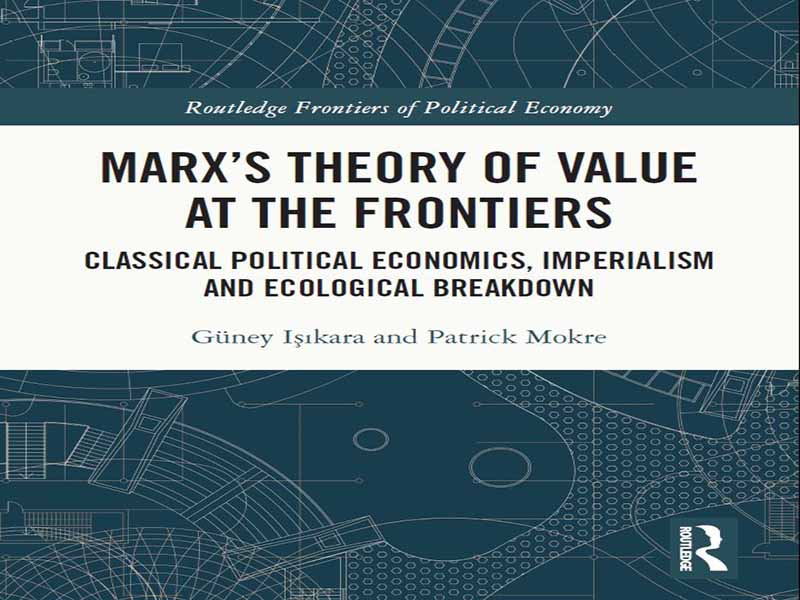- عنوان کتاب: Marxs Theory of Value at the Frontiers -Classical Political Economics, Imperialism and Ecological Breakdowne
- نویسنده: Güney Işıkara, Patrick Mokre
- حوزه: اقتصاد سیاسی
- سال انتشار: 2025
- تعداد صفحه: 221
- زبان اصلی: انگلیسی
- نوع فایل: pdf
- حجم فایل: 9.48 مگابایت
این کتاب درباره قانون ارزش است، اصطلاحی که فرآیندهایی را در بر میگیرد که بازتولید جامعه سرمایهداری را ممکن میسازند، جامعهای که بر اساس مالکیت خصوصی ابزار تولید به واحدهای اقتصادی خصوصی، رقیب، خودمختار و تکهتکه تقسیم شده است. این واحدها از طریق تقسیم اجتماعی کار و مبادله در یک جامعه به هم متصل میشوند. در غیاب تنظیم مستقیم تقسیم اجتماعی کار (که میتواند از طریق سلسله مراتب اجتماعی ناشی از پیوندهای سنتی، خویشاوندی یا برنامهریزی اقتصادی در اشکال مختلف آن رخ دهد)، تعدیل بیوقفه آن با ارجاع به سیگنالهایی که از طریق عمل مبادله قابل مشاهده میشوند، مانند دستمزدها، قیمتها، نرخهای سود و غیره، به صورت پسینی تضمین میشود. محصولات کار در لحظه مبادله به عنوان معادلها، نه از نظر سودمندی اجتماعیشان، بلکه از نظر ارزشهایشان، با یکدیگر روبرو میشوند. به طور خلاصه، قانون ارزش منعکس کننده تعاملات بین این فرآیندهای جزئی است که در وحدت خود، تشکیل دهنده عملکرد شیوه تولید سرمایهداری هستند. این کتاب، دیدگاهی را در مورد چگونگی مطالعه اقتصاد مبتنی بر روابط اجتماعی تولید ارائه میدهد، دیدگاهی که نشانگر آثار اقتصاددانان سیاسی کلاسیک، بهویژه کارل مارکس، است و مدتهاست که توسط رشته اقتصاد معاصر به حاشیه رانده شده، اگر نگوییم کاملاً کنار گذاشته شده است. این دیدگاه در پیشرفتهترین شکل خود، در نظریه ارزش مارکس منعکس شده است که به نظریهپردازی قانون ارزش به عنوان مکانیسم اصلی تنظیم تولید کالایی سرمایهداری اشاره دارد. به طور ضمنی، این کتابی در مورد نظریه ارزش مارکس است که بر بینشهای کلیدی اقتصاددانان سیاسی کلاسیک، بهویژه آدام اسمیت و دیوید ریکاردو، بنا شده است. ما قصد داریم به درک تولید کالایی سرمایهداری که توسط الزام انباشت بیتفاوت به اجتماع و محیط زیست هدایت میشود، کمک کنیم. این الزام، یک فرآیند ذاتاً قطبی و رقابتی است که سرمایهداران را در مقابل سرمایهداران، سرمایهداران را در مقابل کارگران، کارگران را در مقابل کارگران، دولتها را در مقابل دولتها و سرمایه را در مقابل طبیعت غیرانسانی قرار میدهد. علیرغم ماهیت آشفته، متعارض و پویای این فرآیند که شامل تعاملات متقابل و بیوقفه واحدهای مستقل است، برخی از قواعد کمی (مانند برابری آشفته نرخ سود در سرمایهگذاریهای جدید یا تنظیم نهایی قیمتهای بازار توسط کل نیازهای نیروی کار) پدیدار و پابرجا میمانند که منعکسکننده رابطه بین حوزههای مبادله و تولید هستند و از درک ماتریالیستی تاریخ پشتیبانی میکنند. این کتاب چنین قواعد کمی را در حوزه قیمتها از دیدگاه وسیعتر نظریه ارزش مارکسیستی بررسی میکند. این کتاب همچنین یک کتابچه راهنما برای متخصصان است. تحلیل ارزش تجربی و محاسباتی برای دههها در احیای معاصر اقتصاد سیاسی کلاسیک اهمیت داشته است. توسعه مداوم روششناسی و در دسترس بودن دادههای دقیقتر و مکررتر، مشارکتهای اصلی قابل توجهی را در سالهای اخیر امکانپذیر کرده است. ما از یک مدل منسجم از ارزشها و قیمتها بر اساس جداول بزرگ داده-ستانده چندمنطقهایِ بهبودیافته از نظر اکولوژیکی از پروژه EXIOBASE استفاده میکنیم تا نه تنها رابطه منظم بین قیمتهای بازار، قیمتهای تولید و قیمتهای مستقیم، بلکه نظم در انحرافات آنها را از طریق برابرسازی آشفته قیمتهای بازار حول قیمتهای تولید، از طریق انتقال ارزش بینالمللی در رابطه با امپریالیسم و از طریق نقش اجاره زمین در زمینه فروپاشی اکولوژیکی تحلیل کنیم. ما مدل نظری را گام به گام طرح میکنیم، ساختار دادهها را توضیح میدهیم و تفسیر خود از نتایج را توضیح میدهیم، نه تنها برای تأیید نظریه ارزش مارکسیستی، بلکه برای اینکه خوانندگان بتوانند این روش را برای سؤالات خود به کار گیرند.
This book is about the law of value, a term that captures the processes that make possible the reproduction of capitalist society, which is segmented into private, competing, autonomous, and fragmented economic units on the basis of the private ownership of the means of production. These units are cemented together into a society through the social division of labor and exchange. In the absence of direct regulation of the social division of labor (which could take place through social hierarchies mediated through traditional bonds, kinship, or economic planning in its various forms), its ceaseless adjustment is secured a posteriori with reference to signals that become observable through the act of exchange, such as wages, prices, profit rates, and so forth. Products of labor confront each other in the moment of exchange as equivalents, not in terms of their social usefulness but in terms of their values. In a nutshell, the law of value reflects the interactions between these partial processes, which are, in their unity, constitutive of the working of the capitalist mode of production. The book advances a vision of how to study the economy based on the social relations of production, a vision that marks the work of classical political economists,1 particularly Karl Marx, and one that has long been marginalized, if not flatly dismissed, by the contemporary discipline of economics. In its most enhanced form, this vision is captured by Marx’s value theory, which denotes the theorization of the law of value as the principal mechanism regulating capitalist commodity production. By implication, this is a book about Marx’s value theory, which builds upon the key insights of classical political economists, especially Adam Smith and David Ricardo. We intend to contribute to the understanding of capitalist commodity production as driven by the socially and environmentally indifferent imperative of accumulation. That imperative is an inherently polarizing, competitive process that pits capitalists against capitalists, capitalists against workers, workers against workers, states against states, and capital against nonhuman natures. Notwithstanding the chaotic, conflictual, and dynamic nature of this process consisting of ceaseless reciprocal interactions of autonomous units, certain quantitative regularities (such as the turbulent equalization of profit rates on new investment or the ultimate regulation of market prices by total labor requirements) emerge and persist, which reflect the relationship between the spheres of exchange and production, lending support to the materialistic understanding of history. The book studies such quantitative regularities in the domain of prices from the broader viewpoint of Marxist value theory. This book is also a handbook for practitioners. Empirical and computational value analysis has been important in the contemporary revival of classical political economics for decades. Steady development of the methodology and availability of more detailed and more frequent data enabled significant original contributions in recent years. We use a consistent model of values and prices based on the large ecologically enhanced multiregional input-output tables from the EXIOBASE project to analyze not only the regular relationship between market prices, production prices, and direct prices but also regularities in their deviations through the turbulent equalization of market prices around production prices, through international value transfers in relation to imperialism, and through the role of ground rent in the context of the ecological breakdown. We lay out the theoretical model step by step, explain the structure of the data, and explain our interpretation of the results, not only to corroborate Marxist value theory but also to enable readers to apply the method to their own questions.
این کتاب را میتوانید از لینک زیر بصورت رایگان دانلود کنید:
Download: Marxs Theory of Value at the Frontiers




































نظرات کاربران